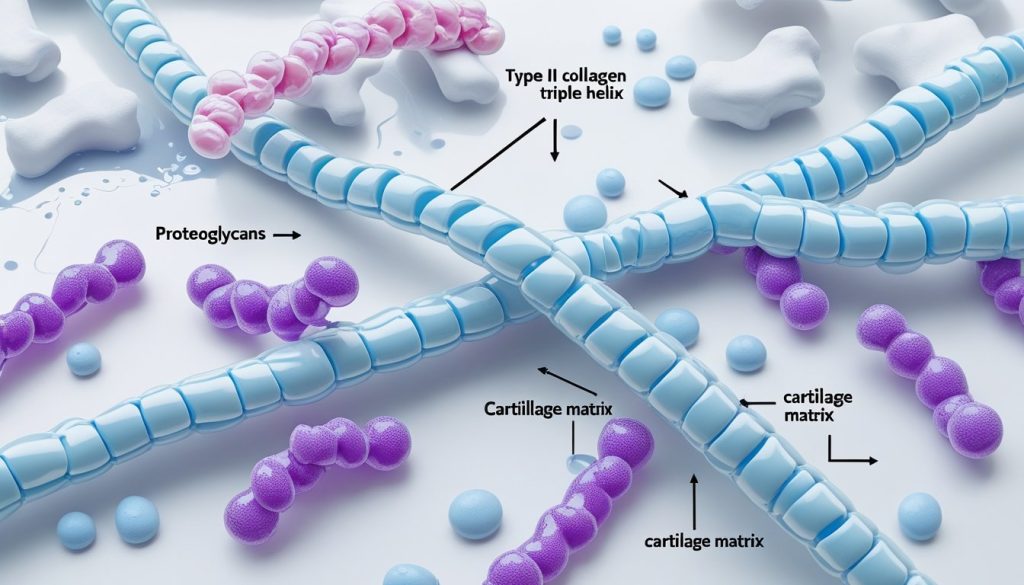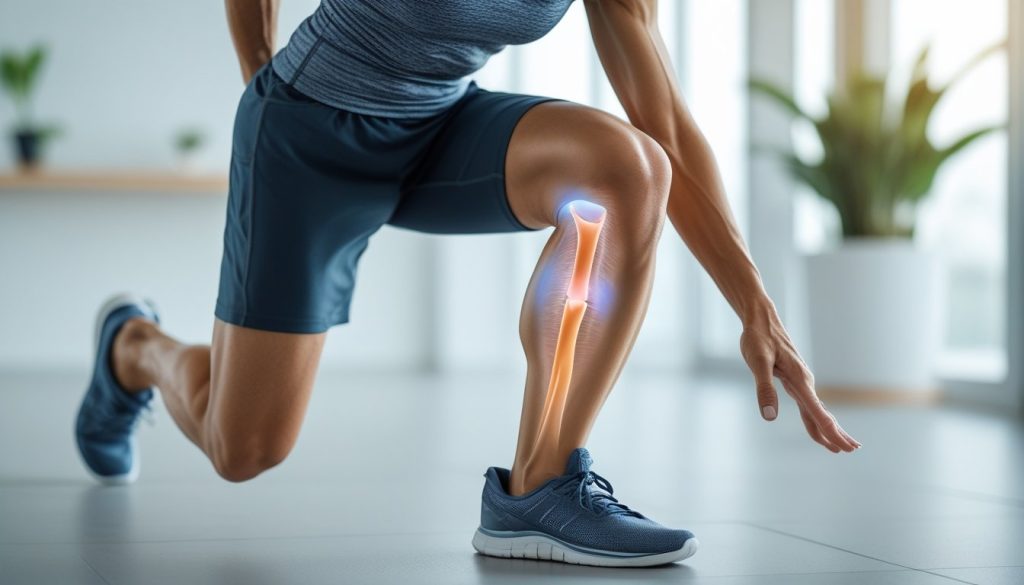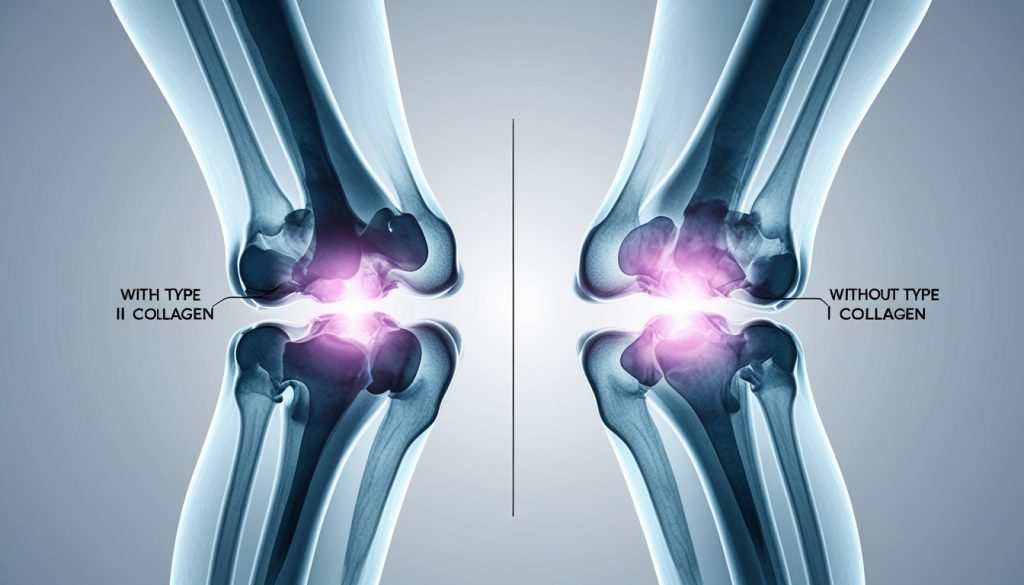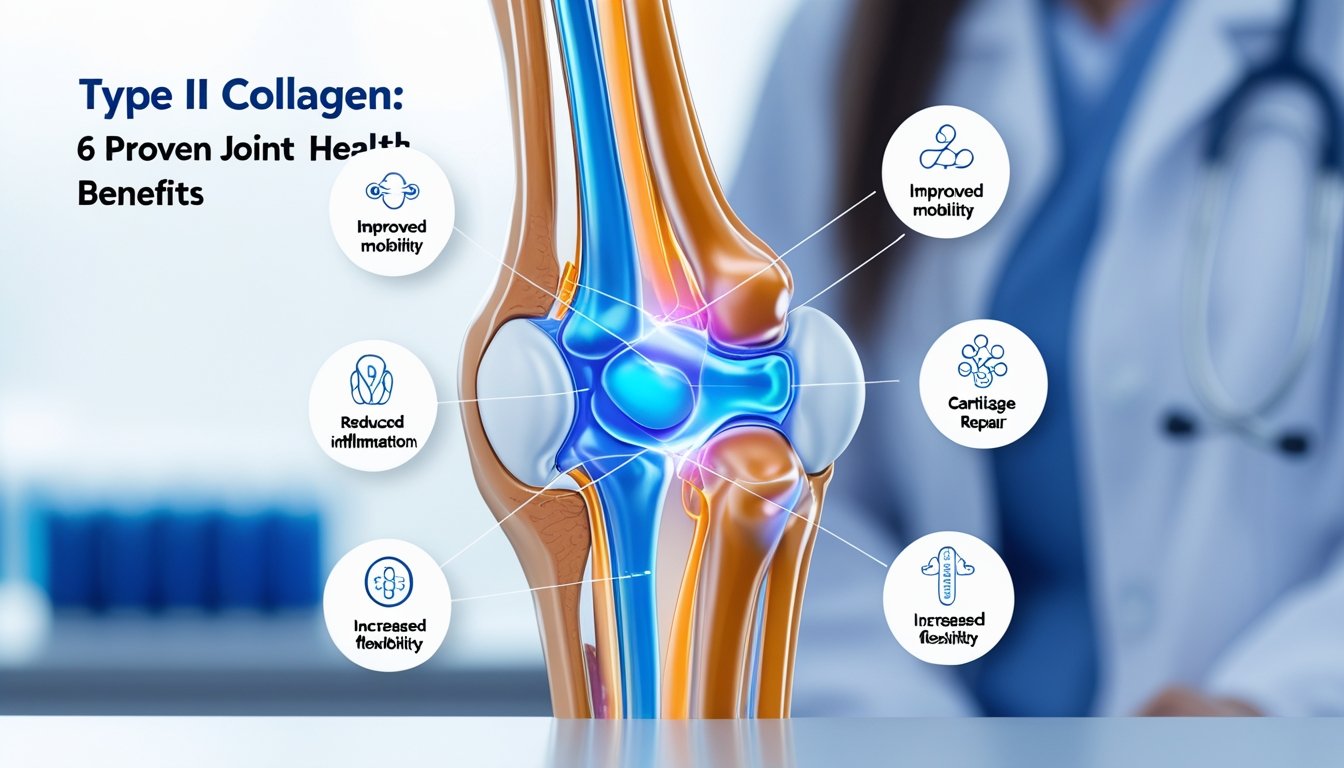Type II collagen has emerged as a revolutionary supplement for joint health, offering targeted support that goes far beyond traditional joint care ingredients.
As the primary structural protein comprising up to 90% of cartilage tissue, type II collagen provides the foundation for healthy, flexible joints that can withstand daily wear and tear13.
Research demonstrates that this specialized form of collagen, particularly in its undenatured state, delivers remarkable benefits through multiple pathways that address both the symptoms and underlying causes of joint discomfort.
From reducing inflammation to supporting cartilage repair, type II collagen represents a scientifically-backed approach to maintaining optimal joint function throughout life.
Understanding Type II Collagen: The Foundation of Healthy Joints
Type II collagen stands apart from other collagen types due to its unique structural composition and specialized role in joint health.
Unlike the more commonly known type I collagen found in skin and bones, type II collagen forms the essential framework of cartilage tissue, providing the tensile strength and elasticity necessary for proper joint function13.
This protein consists of three identical α1(II) chains arranged in a super-helical structure that gives cartilage its remarkable ability to absorb shock and withstand pressure17.
The most significant distinction lies between denatured and undenatured forms of type II collagen.
Undenatured type II collagen (UC-II) has been minimally processed at low temperatures to preserve its three-dimensional structure and active epitopes, which are crucial for its therapeutic effects12. This preservation of the natural protein structure allows undenatured type II collagen to interact with the immune system in ways that support joint health through oral tolerance mechanisms.
Research has consistently shown that undenatured type II collagen, typically derived from chicken sternum cartilage, requires significantly smaller doses compared to other joint supplements to achieve clinical efficacy1.
While traditional joint supplements like glucosamine and chondroitin require gram-level dosing, effective results with type II collagen can be achieved with as little as 40 milligrams daily16.

Six Powerful Ways Type II Collagen Supports Joint Health
1. Reduces Joint Pain and Inflammation Through Immune Modulation
Type II collagen's most well-documented benefit involves its ability to reduce joint pain and inflammation through a sophisticated immune regulation process known as oral tolerance.
When undenatured type II collagen is consumed, it interacts with Peyer's patches in the gut-associated lymphoid tissue, where dendritic cells present the collagen peptides to T cells, generating regulatory T cells (Tregs)5.
These Tregs then circulate throughout the body, producing anti-inflammatory cytokines such as interleukin-10 (IL-10) and transforming growth factor-beta (TGF-β) that help reduce joint inflammation2.
Clinical studies demonstrate the practical effectiveness of this mechanism. In a randomized, double-blind, placebo-controlled study involving 96 healthy subjects with activity-related joint discomfort, participants taking 40 mg of undenatured type II collagen daily for 24 weeks showed statistically significant improvements in knee joint flexibility compared to the placebo group16.
The anti-inflammatory effects were particularly pronounced in animal studies, where UC-II supplementation reduced inflammatory cytokines including IL-1β by 7.8%, IL-6 by 18.0%, and TNF-α by 25.9%19.
The mechanism extends beyond simple inflammation reduction to include modulation of specific inflammatory pathways. Research shows that type II collagen supplementation inhibits the production of prostaglandin E2 (PGE2) and reduces expression of inflammatory mediators, including cyclooxygenase-2 (COX-2), nuclear factor-κB (NF-κB), and matrix metalloproteinases (MMP-3)19. This comprehensive anti-inflammatory approach addresses multiple pathways involved in joint pain and degradation.
2. Enhances Joint Flexibility and Range of Motion
The impact of type II collagen on joint flexibility represents one of its most tangible benefits for individuals seeking improved mobility. Clinical research demonstrates that regular supplementation can produce measurable improvements in range of motion, particularly in knee joint flexibility.
In a controlled study, participants taking undenatured type II collagen experienced a statistically significant increase in knee range of motion flexion of 3.23° compared to only 0.21° in the placebo group16.
The improvements in flexibility appear to be dose-dependent and time-related, with more pronounced benefits observed in older adults. Subgroup analysis revealed that participants over 35 years old experienced a remarkable 6.79° increase in knee ROM flexion compared to just 0.30° in the placebo group16. This age-related benefit suggests that type II collagen may be particularly valuable for addressing the natural decline in joint flexibility that occurs with aging.
The flexibility benefits extend beyond passive range of motion to include functional improvements in joint extension. Study participants showed a 2.21° increase in knee ROM extension over the study period, while the placebo group demonstrated no significant improvement16.
These measurements translate to real-world benefits in activities such as climbing stairs, squatting, and general daily movement patterns that require good knee flexibility.

3. Supports Cartilage Repair and Maintenance
Type II collagen provides the essential building blocks necessary for cartilage synthesis and repair, directly addressing one of the primary concerns in maintaining joint health.
As the dominant protein in cartilage tissue, type II collagen supplementation provides the specific amino acids and peptides necessary for chondrocytes (cartilage cells) to produce new cartilage matrix.
This process is crucial for maintaining cartilage integrity in the face of daily wear and tear, as well as mechanical stress.
Research demonstrates that type II collagen supplementation can stimulate chondrocyte growth and redifferentiation, processes essential for cartilage repair and maintenance17.
In experimental studies, mechanical stress combined with appropriate nutritional support, including type II collagen components, resulted in increased type II collagen production while simultaneously decreasing harmful matrix metalloproteinases (MMP-1 and MMP-13) that break down cartilage14.
The cartilage support extends to protection against degenerative changes. In animal models of osteoarthritis, supplementation with type II collagen combined with glycosaminoglycans showed significantly improved macroscopic cartilage evaluation scores compared to control groups8.
Magnetic resonance imaging biomarkers revealed improvements in cartilage transversal relaxation time (T2) and subchondral bone parameters, indicating enhanced cartilage quality and reduced degradation8.
Importantly, the cartilage maintenance benefits appear to be preventive as well as therapeutic. Studies in healthy dogs undergoing intense exercise regimens have shown that type II collagen supplementation helps prevent exercise-induced cartilage degeneration, as measured by reduced levels of cartilage oligomeric matrix protein (COMP), a biomarker of cartilage breakdown.
4. Regulates Immune Response to Prevent Autoimmune Joint Damage
One of the most sophisticated mechanisms by which type II collagen supports joint health involves its ability to regulate autoimmune responses that can damage joint tissues. This is particularly relevant for conditions where the immune system mistakenly attacks cartilage components, leading to chronic inflammation and joint destruction.
The oral tolerance mechanism induced by undenatured type II collagen helps “teach” the immune system to recognize cartilage proteins as normal, healthy components rather than foreign invaders5.
The immune regulatory effects involve multiple cell types and signaling pathways. Dendritic cells in gut-associated lymphoid tissue process the type II collagen and present it to naive T cells, promoting the development of regulatory T cells specific for type II collagen5.
These specialized Tregs produce immunosuppressive cytokines and can migrate to inflamed joints where they help dampen excessive immune responses.
Clinical evidence supports the therapeutic potential of this immune modulation. While type II collagen supplementation has shown mixed results in rheumatoid arthritis, it demonstrates clear benefits in osteoarthritis, where low-grade inflammation contributes to cartilage degradation7.
The immune regulatory effects appear to be most beneficial when the supplement is taken on an empty stomach, allowing optimal interaction with gut-associated immune tissues9.
Research indicates that the immune modulatory effects extend beyond simple tolerance induction to include regulation of inflammatory cytokine production and enhancement of anti-inflammatory pathways. Studies show increased production of IL-10 and TGF-β, cytokines that actively suppress inflammation and promote tissue repair2.
5. Accelerates Recovery from Exercise and Physical Activity
Type II collagen supplementation provides significant benefits for individuals engaged in regular physical activity or exercise, helping to minimize exercise-induced joint stress and accelerate recovery. This is particularly valuable for athletes, fitness enthusiasts, and anyone whose lifestyle involves repetitive joint loading that can lead to microtrauma and inflammation.
In a controlled study of healthy Labrador Retrievers undergoing an intensive 11-week endurance exercise regimen, dogs supplemented with undenatured type II collagen demonstrated superior performance metrics and reduced inflammatory markers compared to the placebo group20.
The supplemented dogs showed greater activity per kilometer and higher average moving speeds throughout the exercise program, suggesting improved exercise tolerance and reduced fatigue.
The recovery benefits are supported by measurable changes in inflammatory biomarkers. Dogs receiving type II collagen supplementation had significantly lower levels of interleukin-6 (IL-6) following exercise compared to the control group20.
Additionally, cartilage oligomeric matrix protein (COMP), a key biomarker of cartilage breakdown, was significantly lower in the supplemented group following intense exercise, indicating reduced exercise-induced cartilage stress.
The hematological benefits extended to immune cell profiles, with supplemented animals showing healthier lymphocyte counts and neutrophil-to-lymphocyte ratios, suggesting a more balanced inflammatory response to exercise stress20. These findings indicate that type II collagen supplementation may help maintain optimal immune function during periods of increased physical stress.
Image Placement 3:
Alt Text: Athletes taking type II collagen supplements for joint recovery
Title: Type II Collagen Exercise Recovery Benefits
Caption: Type II collagen supplementation supports faster recovery from exercise-induced joint stress
Description: Active individuals using type II collagen to maintain joint health during intense training
6. Slows Joint Degeneration and Osteoarthritis Progression
Perhaps one of the most clinically significant benefits of type II collagen supplementation is its ability to slow the progression of osteoarthritis and other degenerative joint conditions. This protective effect involves multiple mechanisms that address both the inflammatory and structural components of joint degeneration.
Clinical studies demonstrate that type II collagen supplementation can improve self-reported symptoms of osteoarthritis, including pain and stiffness, when taken for periods of up to six months7.
The improvements appear to be sustained with continued use, suggesting genuine modification of disease progression rather than temporary symptom masking.
In animal models of osteoarthritis, type II collagen supplementation significantly reduced Kellgren-Lawrence scoring, a standardized measure of joint degeneration severity19. The 53.3% reduction in osteoarthritis scoring was accompanied by decreased levels of inflammatory cytokines and reduced expression of cartilage-degrading enzymes19.
The protective effects extend to multiple joint structures beyond cartilage. Research shows that type II collagen supplementation can positively influence synovial membrane health, subchondral bone integrity, and overall joint architecture8. Magnetic resonance imaging studies reveal improvements in cartilage quality markers and reduction in bone changes associated with osteoarthritis progression.
Long-term studies in companion animals demonstrate sustained benefits with continued supplementation. Dogs with degenerative joint disease showed significant improvements in pain scores, general condition, appetite, mobility, and lameness when supplemented with undenatured type II collagen for six months18. The benefits were maintained throughout the study period, indicating genuine disease modification rather than temporary symptomatic relief.

Optimal Dosage and Usage Guidelines
The effectiveness of type II collagen supplementation depends significantly on proper dosage and timing. Research consistently shows that undenatured type II collagen is effective at much lower doses than traditional joint supplements, with most clinical studies using 40 milligrams daily. This dose provides approximately 3.2 milligrams of active, undenatured type II collagen, based on standardized extracts containing 8% undenatured collagen.
Timing of supplementation appears to influence effectiveness, with research suggesting that taking type II collagen on an empty stomach may optimize absorption and immune system interaction9.
The supplement can be taken at any time of day; however, many practitioners recommend taking it in the morning before breakfast to ensure optimal gastric conditions for absorption.
The benefits of type II collagen supplementation typically become apparent within several weeks to months of consistent use.
Clinical studies showing significant improvements in joint function and flexibility utilized supplementation periods of 12 to 24 weeks16. This time frame reflects the gradual nature of cartilage remodeling and immune system adaptation.
Safety profiles for type II collagen supplementation are excellent, with research demonstrating broad-spectrum safety even with long-term use1.
The supplement is generally well-tolerated with minimal side effects reported in clinical trials. However, individuals with known allergies to chicken products should exercise caution, as most commercial type II collagen supplements are derived from chicken cartilage.
Scientific Evidence and Clinical Validation
The scientific foundation supporting type II collagen supplementation continues to expand, with numerous peer-reviewed studies demonstrating its efficacy across various populations and conditions.
A modified ELISA methodology has been developed to precisely measure undenatured type II collagen content in supplements, ensuring accurate dosing and consistent clinical effects1.
Multicenter, randomized, double-blind, placebo-controlled studies represent the gold standard for clinical evidence, and type II collagen supplementation has been validated through multiple such trials16.
These studies consistently demonstrate statistically significant improvements in joint function, flexibility, and comfort compared to placebo treatments.
The evidence base extends across species, with similar benefits demonstrated in humans, dogs, and other mammals620. This cross-species validation strengthens the biological plausibility of the proposed mechanisms and suggests broad applicability of the research findings.
Recent advances in analytical techniques allow for precise measurement of type II collagen's effects on cartilage metabolism and inflammatory biomarkers119. These objective measures complement subjective assessments of joint comfort and function, providing a comprehensive picture of type II collagen's therapeutic effects.
Frequently Asked Questions About Type II Collagen
1. How long does it take to see results from type II collagen supplementation?
Most clinical studies show improvements beginning within 4-8 weeks of consistent supplementation, with optimal benefits typically observed after 12-24 weeks of regular use16.
2. What's the difference between type II collagen and other collagen types?
Type II collagen is specifically found in cartilage and joint tissues, while type I collagen is primarily in skin and bones, and type III collagen supports skin and organ structure3. Type II collagen is uniquely suited for joint health support.
3. Can type II collagen be taken with other joint supplements?
Yes, research shows that type II collagen can be safely combined with other joint health ingredients like glucosamine, chondroitin, and hyaluronic acid, potentially providing enhanced benefits8.
4. Is undenatured type II collagen better than hydrolyzed collagen for joints?
For joint health specifically, undenatured type II collagen appears more effective due to its preserved three-dimensional structure and immune-modulating properties, requiring much smaller doses than hydrolyzed forms9.
5. Are there any side effects associated with type II collagen supplementation?
Type II collagen supplementation has an excellent safety profile with minimal reported side effects in clinical studies. Individuals with chicken allergies should exercise caution1.
6. How does type II collagen work differently from glucosamine and chondroitin?
Type II collagen works primarily through immune system modulation and oral tolerance, while glucosamine and chondroitin provide building blocks for cartilage synthesis. Type II collagen is effective at much smaller doses1.
7. Can type II collagen help with rheumatoid arthritis?
While studies show mixed results for rheumatoid arthritis, type II collagen appears more beneficial for osteoarthritis and general joint health maintenance7.
8. What's the optimal dose of type II collagen for joint health?
Clinical research supports 40 milligrams daily of undenatured type II collagen supplement, typically providing 3.2 milligrams of active undenatured collagen116.
9. Should type II collagen be taken on an empty stomach?
Taking type II collagen on an empty stomach may optimize its interaction with gut-associated immune tissues, though it can be taken with food if preferred9.
10. How does age affect the benefits of type II collagen supplementation?
Research suggests that individuals over 35 years old may experience more pronounced benefits from type II collagen supplementation, particularly regarding joint flexibility improvements16.
Conclusion: The Future of Joint Health Support
Type II collagen represents a paradigm shift in joint health supplementation, offering targeted support through multiple scientifically-validated mechanisms.
From reducing inflammation and supporting cartilage repair to enhancing flexibility and slowing the progression of degenerative changes, this specialized protein offers comprehensive joint health benefits that extend far beyond traditional supplements.
The growing body of clinical evidence, combined with excellent safety profiles and relatively low dosing requirements, positions type II collagen as an essential component of modern joint health strategies.
As research continues to unveil the complex mechanisms underlying the effects of type II collagen, its applications in preventive joint care and therapeutic interventions will likely expand.
For individuals seeking evidence-based approaches to maintaining optimal joint function throughout life, type II collagen supplementation offers a scientifically grounded solution backed by rigorous clinical validation.
Ready to optimize your joint health naturally? Understanding the role of amino acids in collagen synthesis can further enhance your journey to improved joint health. Discover how specific amino acids support collagen production and joint function to maximize your results and maintain healthy, flexible joints for years to come.

